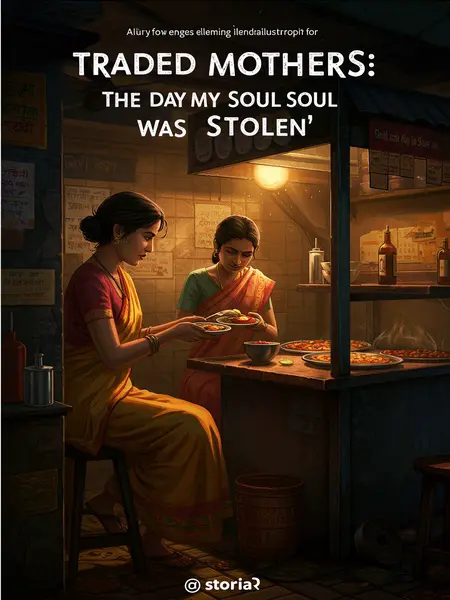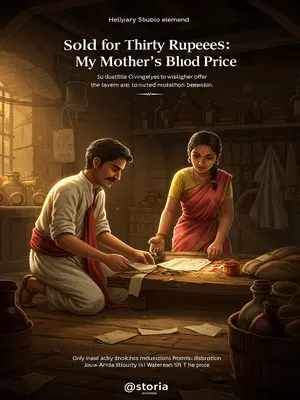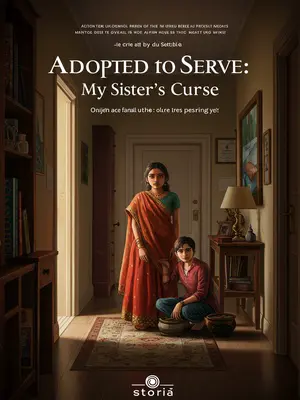Chapter 6: New Shoes, Old Phones, and Small Kindnesses
Back at Priya’s house, it was even smaller than I’d imagined.
The single-room flat above the kirana shop was cramped. Ceiling fan rattling, paint peeling, a cracked mirror reflecting two lifetimes’ worth of struggle.
The living room was a bit messy, with children’s picture books and toys piled on the sofa.
Plastic dolls, missing limbs, and a half-broken car peeked from under a faded bedsheet. There was a smell of turmeric and old books in the air.
Oh, right—Priya said she had a little sister, not even three years old yet.
A faint giggle from the next room, then a tiny voice singing a nursery rhyme. My heart twisted.
“Priya, are you still mad at mum?” Priya’s mother took out a shoebox and put it on the plastic stool near the tube light. “The shoes you like, mum scraped together the money to buy them for you. See if it’s the right pair. If it’s not the right pair, beta, we’ll go to Linking Road on Sunday and find another. Promise.”
Her voice was so hopeful. The plastic stool wobbled, threatening to topple, but her hands were steady, offering up the box like a treasure chest.
I opened the shoebox, and inside was a pair of fake branded shoes.
The logo was crooked, the stitching uneven. I tried not to wince. But the shoes looked clean, soles unworn.
I could tell at a glance they were fake, because just last week my mother bought me a real pair and made me wear them to school on the fifteenth of every month.
Every month, she’d inspect the shoes, her eyes sharp, ticking off a mental checklist. Priya would always ask, ‘How much, yaar?’ and I’d shrug, pretending it was no big deal.
Although I didn’t like those shoes at all, I numbly followed her instructions and wore them. At that time, Priya noticed my new shoes, checked the price on Flipkart, and sulked the whole day.
I remembered her face, lips pressed tight, refusing to share her chips with me. The world’s fairness measured in footwear.
“Priya, did mum buy the wrong pair?”
Her gentle, careful voice pulled me back to reality. Looking at her expectant eyes, I suddenly felt a warm current in my heart. “No, it’s just that my classmate has the same pair. Can I pick another one?”
I tried to sound casual, not wanting to break her heart. But inside, I was aching for her to understand that the effort mattered more than the brand.
“Of course you can. Here, take my phone. After you choose, just put it in the shopping cart. Mum will go next door to pick up your sister.”
She handed me her phone and turned to leave.
The phone’s cover was peeling, stickers of cartoon gods barely hanging on. Her sacrifice, her trust—suddenly, I felt unworthy.
So, she had to leave her younger daughter with the neighbour every day just to pick up her elder daughter.
Aunty next door—always peeking through the jali door—must have become family. Priya’s mother’s life was woven from small favours and big heartaches.
But a seventeen- or eighteen-year-old girl could have taken the bus by herself long ago; she didn’t really need to be picked up daily.
I wondered if Priya pretended to be helpless, or if her mother just needed the excuse to show her love.
Was it just to save the four-rupee bus fare?
In these narrow lanes, every rupee counted. I suddenly felt ashamed of all the money I’d wasted on pointless gadgets.
I stared at her phone. It was an old model from three years ago, with two cracks on the screen. Both the background and lock screen photos were of Priya and her sister. You could see that Priya’s mother was frugal, but she truly loved her two daughters.
Their smiles lit up the screen brighter than any LED display. Even the cracks looked like lightning bolts of hope.
How nice. Such a good mother will be mine from now on.
I closed my eyes, clutching the phone. ‘Bas, yahi toh chahiye tha.’













